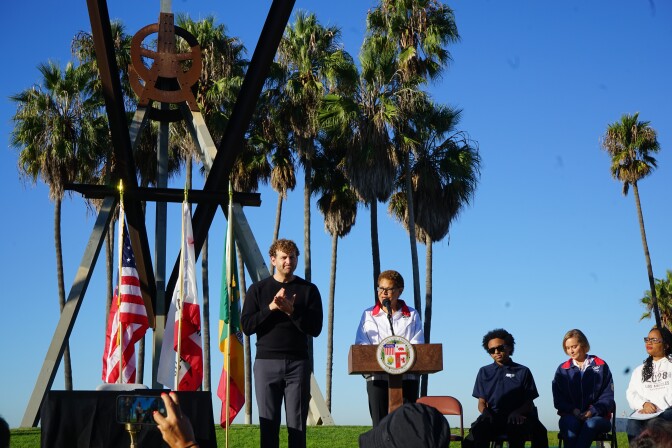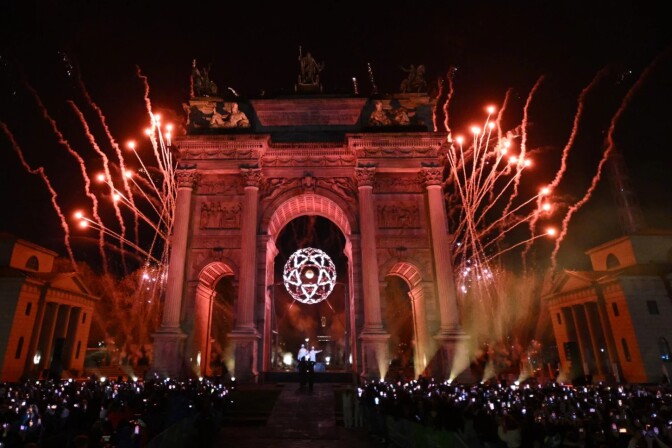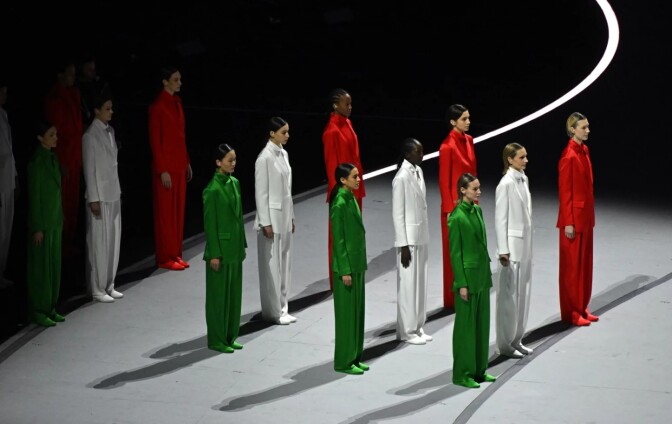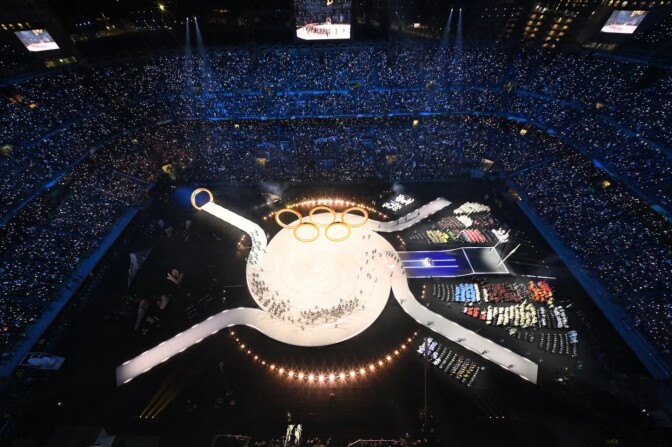If you're wondering whether it is truly worth the $8 million to $10 million cost per 30 seconds to air a commercial during the Super Bowl, just ask the creative minds behind the pro-Jesus advertising campaign "He Gets Us."
According to Come Near, the group managing the "He Gets Us" campaign, after airing commercials in three previous Super Bowls, they have seen nearly 10 billion video views, more than 70 million visitors to their website HeGetsUs.com and an awareness of the campaign so high that 40% of adults in the U.S. now know about He Gets Us.
And they expect that awareness to only expand with their fourth Super Bowl ad this Sunday titled "More," focused on the pressures many feel in modern society to pursue more of everything.
"There's not a lot of moments like this. … We're looking for moments where people really congregate," says Simon Armour, chief creative officer for Come Near, which has crafted the "More" ad as part of a campaign called "Loaded Words." "We're constantly asking, 'Are we really meeting people where they're at?'"
Offering a distinctly non-commercial message in the middle of the world's biggest advertising showcase is certainly one way to stand out. But that's only one of the many messages featured in an event that set a record last year — and the year before — as the most watched single telecast in U.S. history.
A dive into the raft of ads airing in the Big Game that were released early, aimed at rocketing around social media to build buzz before their debut Sunday, revealed the typical mix of celebrities, nostalgia, special effects and bold humor we see every year.
New in the mix: A few efforts encouraging fans to build their own Super Bowl commercials, including an option from Uber Eats allowing users to make 1,000 versions of celebrity-filled ads and a contest sponsored by Artlist.io, an AI platform for video creation, offering $60,000 for the best subscriber-created spot.
And, as we have seen in recent years, there's a decided lack of commercials offering any kind of sharp social message. At a time when America seems more divided than ever, most advertisers don't seem keen on spending millions to address the social or political issues of the day.
Of course, the most impressive messages may not surface until the Big Game itself. But here's a look at some of the most interesting commercials unveiled in advance, offering a look at the bold swings marketers are about to take on the biggest stage in media.
Best use of a self-deprecating celebrity, Part 1: Raisin Bran's 'Will Shat'
YouTube
One of the coolest things in modern pop culture has been to watch Star Trek icon William Shatner morph from an overacting, self-serious stick in the mud into a goofy celebrity who begrudgingly accepts that it's better to play along with his peculiar kind of fame rather than resist it. The 94-year-old comes full circle with this ad for Raisin Bran that deftly spoofs both the result of eating all that fiber, Shatner's roots in science fiction and the scatological word game people likely have played with his last name for eons, introducing him in the commercial as a character named Will Shat. My favorite moment: when he looks over at a pet and asks, "Is that dog a Shih Tzu?" As a bonus, the Shat-man even made news in real life, when paparazzi thought he was eating a bowl of cereal while driving (he was actually posing for a photo shoot.)
Most touching reference to Big Brother: Ring's 'Search Party: Be a Hero'
YouTube
Tell people that video doorbell company Ring can remotely link a bunch of cameras to look for something, and many may wonder if they've stumbled into a George Orwell novel. But show people how Ring cameras can be tasked to help find some of the 10 million dogs who go missing every year — using its new, free Search Party feature — and you have a teary, sentimental spot for the Big Game that pulls on the heartstrings while downplaying any concerns about Big Brother invading their privacy (fear not, Search Party is a program you have to opt into).
Best argument to Hollywood for using AI: Xfinity's 'Jurassic Park … Works'
YouTube
Cool as it is to suggest that one tech geek from Xfinity could have kept all the dinosaurs from escaping Jurassic Park, the telecommunication company went one better in this ad – basically showing the potential for de-aging and computerized imagery in film by creating new scenes for the 1993 movie featuring stars Sam Neill, Laura Dern and Jeff Goldblum. In Xfinity's new spot, they're jogging with herds of dinosaurs and posing for pictures with a T. rex instead of running for their lives. Of course, a happy ending invalidates the film's whole "egotistical man shouldn't meddle with natural ecosystems he doesn't understand" message. But it will probably sell an awful lot of Wi-Fi service.
Best use of a self-deprecating celebrity, Part 2: TurboTax's 'The Expert'
YouTube
Adrien's Brody's over the top antics while portraying a TurboTax expert – despite the company's insistence that the program helps keep taxes "drama free" — is a delicious send-up of his own self-serious reputation. (My fave moment is when he screeches "If there's no drama, then there's no Adrien Brody!") It's almost enough to make you forget the record-setting arrogance of his way-too-long best actor acceptance speech at last year's Oscars ceremony. Almost.
Best headfake around men's silly sensibilities: Novartis' 'Relax Your Tight End'
YouTube
What's the best way to let men know there's now a less, um, invasive way of checking for prostate cancer than the old school finger method? This commercial, featuring football heroes like former New England Patriots tight end Rob Gronkowski and former Tampa Bay Buccaneers coach Bruce Arians urges men to relax their tight end — complete with shots that seem to depict that relaxation — thanks to the invention of a blood test to check for early signs. It's all a bit of cheeky good fun — OK, I couldn't resist that one — aimed at getting men to get over their hangups and get tested regularly for a disease that has an impressive survival rate if caught early.
Best use of class warfare: Hims & Hers' 'Rich People Live Longer'
YouTube
Fresh off a controversy from last year, which found the telehealth company criticized for not being fully transparent about the side effects of its weight loss drugs, Hims & Hers is back with a spot that declares "the wealth gap is a health gap." Rapper and actor Common provides the voice-over for this spot, which shows wealthy people accessing all kinds of treatments and preventive care as the narration notes, "all that money doesn't just buy more stuff — it buys more time." Watching a big corporation spend millions pitching its products as an affordable way to bridge that gap, at a time when medical expenses are one of the leading causes of bankruptcy in the U.S., feels a little odd. But it's also a stroke of genius.
Best parody of a competitor: Pepsi's 'The Choice'
YouTube
This spot, starting with a computer-generated polar bear getting confused after picking Pepsi over Coca-Cola in a blindfolded taste test, works in all kinds of ways. It pokes at Coke's longtime use of computerized bears in its own Big Game ads back in the day while indulging a bit of nostalgia. Extra points for a moment later in the ad that references the infamous Coldplay kiss cam incident and a cool cameo from impish director Taika Waititi.
Most questionable joke: DoorDash's 'Beef 101'
YouTube
In the ad, 50 Cent presents the latest iteration of his beef with Sean "P Diddy/Puff Daddy" Combs as an epic exercise in tongue-in-cheek trolling. He reaches into a DoorDash pouch to pull out a bag of Cheesy Puffs, a pack of combs and a bottle of cognac he says is "aged four years … or 50 months. Who's keeping count?" But I bet Combs, now sitting in federal prison after his conviction on prostitution-related charges, surely is. And those who recall the allegations of sex crimes and abuse which surrounded the Combs trial, might not find a commercial seeking laughs by referencing that traumatic situation to be much fun at all.
Most shameless pandering to bro culture: Bud Light's 'Keg'
YouTube
Football legend Peyton Manning, comic Shane Gillis and musician Post Malone seem mostly wasted in a nonsensical ad featuring an entire wedding party tumbling down a steep hill in pursuit of a single keg that fell off a dolly. Gillis gets the punchline, turning to the camera to say, "I give it a week," presumably in reference to the wedding. I'm betting most viewers forget about this uninspired ad even quicker.
Best use of a conspiracy theory I might actually believe: Uber Eats: 'Hungry for the Truth'
YouTube
This spot continues the concept Uber Eats floated in last year's Super Bowl ad, featuring Matthew McConaughey insisting the NFL organized this whole professional football thing as a ruse to sell more food. This time, he's torturing poor fellow movie star hunk Bradley Cooper — who mostly looks like he just wants to be seen wearing gear featuring his beloved Philadelphia Eagles — pointing out all the NFL players named after food. But when he shows Cooper that the NFL Hall of Fame building looks just like a juicer — gotta say, I was nearly convinced.



















